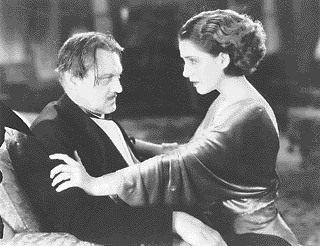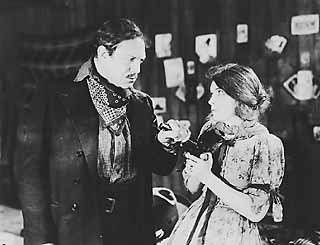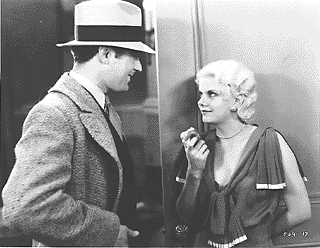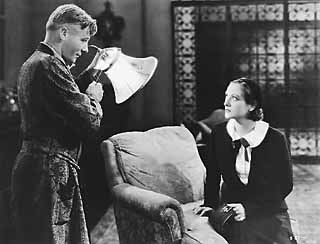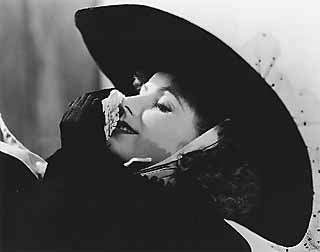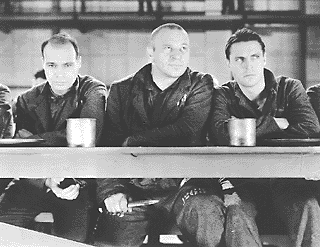That's Not All She Wrote
By Marjorie Baumgarten, Fri., April 2, 1999
|
|
Hollywood's early decades were kind to professional women -- at least to those who labored off the screen. If onscreen there was never much doubt that women's highest aspiration and truest occupation was love (and all the work that went into its preparation, discovery, maintenance, and crisis management), offscreen it was a different story.
Women during those early years of filmmaking fared well. There was an unusually large number of women screenwriters, as well as a handful of producers and such thriving directors as Alice Guy-Blaché (who is credited with having created the first feature-length narrative film) and Lois Weber (whose films explored such topics as abortion and white slavery). Guy-Blaché even had her own production company, as did many of the more successful actresses (Mary Pickford, Norma and Constance Talmadge, Alla Nazimova, and others). A number of other examples exist, although too few of the films they made still exist.
|
|
It was as screenwriters, however, that women made their most noticeable contributions. During the Teens, Twenties, and early Thirties, it's estimated that approximately 25 percent of the screenwriters in Hollywood were women. Why that was and what happened to cause their decline is a subject in need of further study. The Austin Film Society's new series, "Calling the Shots: Women Screenwriters of the 1930s," provides some examples toward that end.
|
|
At present, the questions are more numerous than the answers. To pose but a few:
- Were films written by women qualitatively and thematically different from movies written by their male counterparts, and if so, in what ways?
- How did the entrance of sound pictures at the end of the Twenties affect the kinds of scripts and dialogue women screenwriters wrote?
- Did the talkies' influx of Broadway theatre folk to the more lucrative avenues of Hollywood & Vine deflate the opportunities for women screenwriters who lacked those high-art pedigrees?
- How did the Depression affect working women?
- Did the attitudes of the studio heads and their division heads affect their hiring policies? (Why, for example, did so many women write for MGM and its production chief Irving Thalberg?)
- Is the predominance of one sex over another in a particular field of employment representative of the societal value placed on that occupation? (Why, for example, did secretarial work shift from a male-identified occupation to a female-identified one?)
- What parallels exist between the marked prominence women enjoyed as newspaper journalists during this era and the success they experienced as Hollywood screenwriters?
|
|
Two women whose work in journalism segued into careers as top-drawer screenwriters were Frances Marion and Adela Rogers St. Johns. The prolific screenwriting career of star Hearst reporter St. Johns is represented in the AFS series by only one film: A Free Soul, an adaptation (by Becky Gardiner -- another prolific screenwriter of the period) of St. Johns' autobiographical novel about a sybaritic socialite. Lionel Barrymore won an Oscar for his performance as the woman's father, the attorney for a man he successfully defends from a murder rap and with whom his daughter then falls in love. Norma Shearer, Clark Gable, and Leslie Howard also star in the film. A Free Soul was directed in 1931 by Clarence Brown, the same year he directed Joan Crawford and Gable in another film showing in this series, Possessed. Written by Lenore Coffee, Possessed is an amazingly up-front story about a young woman who escapes her dead-end factory job for the excitement of becoming the mistress of a handsome Manhattan politician. Both films are also fascinating, because they represent the studios' last gasp of full-fledged creative freedom before they acquiesced to the self-censorship of the Hays Office, which insisted on the upholding of certain moral standards and the punishment of all wrongdoing by the final reel.
|
|
Frances Marion worked as a war correspondent before generating more than 150 scenarios and screenplays between the teens and the end of the Thirties. The remaining four films in the AFS series were either penned by Marion alone or list her as one of the contributing screenwriters. Two of the films, The Secret Six and The Big House, are directed by her husband at the time, George Hill. The other two, The Wind, which stars Lillian Gish, and Camille, which stars Greta Garbo, are films that highlight Marion's ability to write strong women characters. Marion was the highest paid screenwriter of her time (earning upward of $3,000 a week), and also the most sought after. She twice received Academy Awards, for her original screenplays of The Big House and The Champ. She also served as the first vice president of the Screen Actors Guild.
|
|
"Calling the Shots" will not answer all the questions proposed at the outset, but this series offers some rarely screened films that provide excellent case studies for deeper contemplation. Beginning with last week's screening of George Cukor's classic The Women (scripted by Anita Loos and Jane Murfin, based on a play by Clare Booth), the series also promises to deliver a lot of fun and unique screening opportunities.





